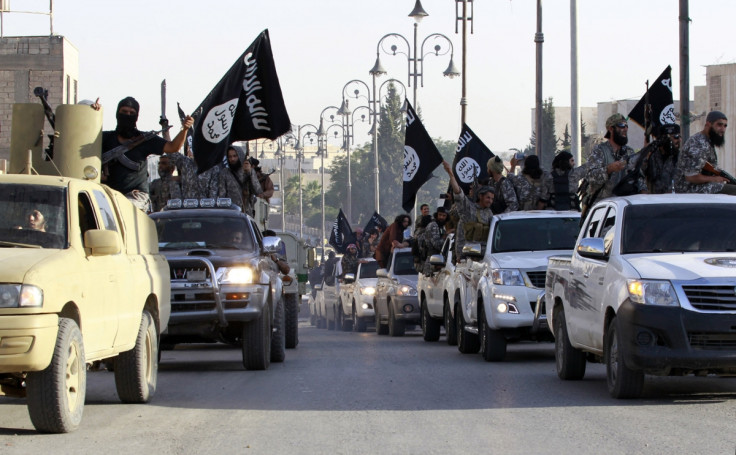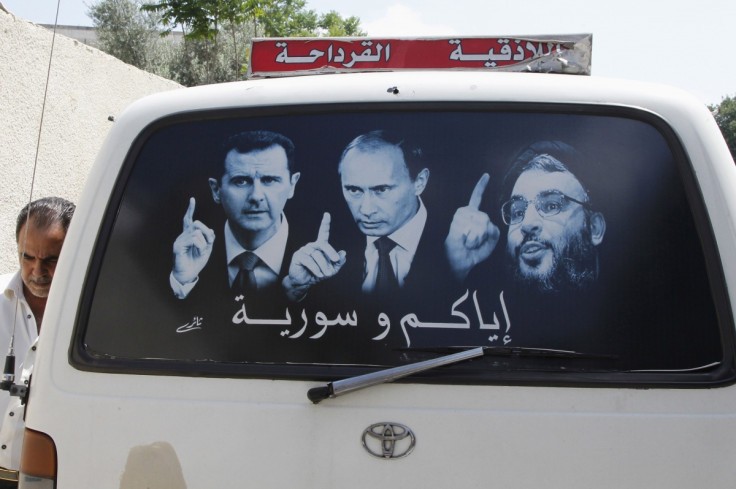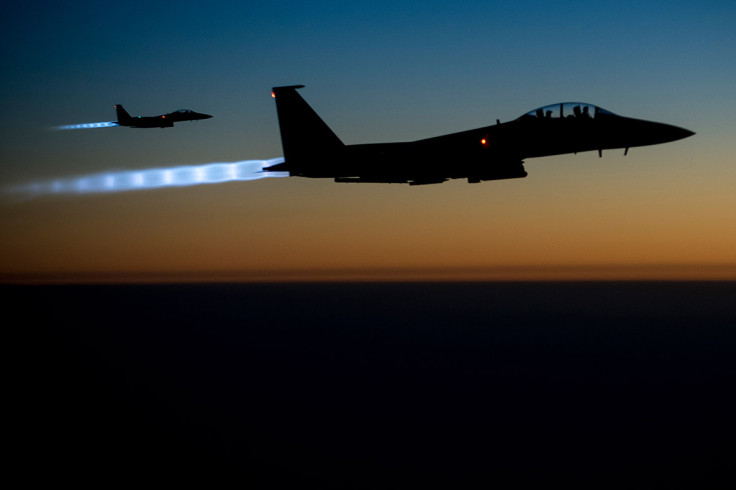Should the West collaborate with Russia in the fight against Islamic State?

Large areas of ground have been cleared. Trucks are driving to and from the site. Helipads have been built and runways resurfaced. The satellite pictures obtained this week by Foreign Policy magazine leave in no doubt the scale of Russia's redevelopment of the air base in Latakia on Syria's northern coast, from where experts believe they plan to launch waves of air strikes against groups battling to oust the regime of the country's long-time ally, President Bashar al-Assad, which include Islamic State.
Russia's increased military presence in the area is of concern to Western officials. They claim it will further destabilise a country torn apart by four-and-a-half years of brutal civil war, which has killed more than 200,000 people and sparked the greatest refugee crisis since the Second World War. Assad, whose brutal attempts to suppress peaceful popular demonstrations in 2011 sparked the war, must step down if Syria is to achieve peace, they argue. British Prime Minister David Cameron even suggested that UK military force could be used against the forces of both Assad and Isis as a means to ending the Syria conflict.
But Russia argues there is an urgent danger: Islamic State, and Assad's forces are the only player in the civil war capable of defeating the jihadist group. Following a series of defeats for government forces at the hands of IS, including the loss of the ancient city of Palmyra, the Kremlin is bolstering Assad's forces with military advisers, equipment, and weapons.

The Ukraine crisis has caused Western and Russian relations to deteriorate to their lowest point since the Cold War, with the West imposing economic sanctions on Russian individuals close to Putin, and on Russian companies and banking facilities, after Russia annexed Crimea. But with the emergence of IS, do the two powers face a common enemy so dangerous that it requires them to suspend geopolitical rivalries, and for the West to accept Putin's offer to support Assad and join its international "anti-terror" coalition?
Mutual threat of Isis
IS is threatening Russian interests, as hundreds of people from former Soviet central Asian republics joining the group, while fears in Moscow are growing that they could return to their home countries to launch terror attacks. The US has launched air strikes against IS positions in Syria, but the jihadist group has expanded the territory it controls, and a $500m (£322m) US programme to train moderate rebels to take on IS has resulted in only "four or five" fighters being successfully deployed.
For Alexander Nekrassov, a former Kremlin adviser who is now a journalist and commentator, both "common sense and logic" dictate that Assad's forces must be supported if IS is to be defeated.
"Russia realises that while Isil [IS] is there the only power that can fight it acceptably is the Syrian army. And the Syrian army, despite all the lies, has been loyal to Assad to all these years. All the predictions they would start defecting [to rival rebel groups] are wrong. That is why it is only logical that in this critical situation you do not change the government of Syria," said Nekrassov.
For Nekrassov, deposing Assad now would turn Syria into a second Libya, where no central government currently exists and rival rebels groups vie for dominance, after a Western-backed rebellion toppled the dictator Muammar Ghaddafi in 2011.
"We have seen what happened to Libya. Well the [immigration] crisis in Europe at the moment is a result of what happened to Libya being destroyed by the western countries. So the same thing would happen to Syria or even on a bigger scale than in Libya [should Assad be deposed]", said Nekrassov.

Russia's involvement in Syria has to be understood as part of its broader geopolitical rivalry with the West argues Andrew Foxall, director of the Russian Studies Centre at the Henry Jackson Society think tank. Jackson believes Putin's enthusiasm to join the fight against IS ought not to be taken at face value. He claims there are similarities with the way Putin achieved domestic objectives by claiming his brutal suppression of the Islamist insurgency in Chechnya was part of the wider "war on terror" and his current global strategy strategy.
"Firstly Russia is trying to portray itself as reasonable partner or acceptable partner for the West on a number of issues. And secondly one could understand this as being all about Ukraine and western sanctions," said Foxall. "I think Putin and [Russian Foreign Minister Sergey Viktorovich] Lavrov will be making the point that if Russia helps the West on IS they will expect something in return.
"That may be a draw-down of sanctions or a non-renewal of sanctions. It may be passive recognition of Russia's sovereignty over Crimea. It may be passive recognition of Russian control over the Donbass. But I do think Ukraine is the elephant in the room when Russia is thinking about Syria."
Putin's strategy: divide and conquer
Foxall said that the Russia's strategy may be to open up divisions within the West. "I think the US probably understands [Russia's strategy] and is against it," he said. "The EU is a different animal. All you would need is one state to buy into President Putin's line of thinking and EU sanctions aren't renewed."
The sticking points are Assad, and the current American administration's determination not to cede to a Russian regime it regards as belligerent and bullying.
Assad's forces have been accused of using chemical weapons and barrel bombs to slaughter thousands of civilians in his administration's efforts to quell the uprising. Those suspected of opposing the regime have been seized in mass arrests, with many executed and tortured to death in secret prisons, according to human rights groups.
The brutality of the Assad regime has inspired thousands of Muslims to travel to Syria to join the rebellion, which has been hijacked by the jihadist groups who stand as the Assad regime's chief rivals: Islamic State and the Al-Qaeda affiliated group Al-Nusra. Both style themselves as the defenders of Sunni Muslims against tyrants and the "apostates" of Assad's Alawite regime.
The Assad question
Nakrassov insists that "No-one is clinging onto Assad" in the Kremlin. Putin recently announcing that the Syrian president will share power with "healthy" opposition, and a Finnish diplomat told the Guardian that Russia actually offered to negotiate Assad's removal from power in an effort to resolve the Syrian civil war in 2012. For Nekrassov though, the rise of Islamic State has altered the dynamic.
"It was pragmatic [to suggest Assad leave office] at the time because maybe Russia could have found a temporary solution and found somebody to take over from him," said Nekrassov. "What the West doesn't understand about Syria and what Russia does understand, is that if Assad goes at once without any replacement of any kind, credible replacement, there will be another Libya. More terrorist moving to other countries. And Isis, which is being bombed so professionally they are getting stronger by the day, it will make them stronger. It is crazy on the part of [US President Barack] Obama, [UK Prime Minister David] Cameron and [French President Francois] Hollande do demand that he steps aside now when the enemy is Isis. The main enemy at the moment is Isis."
Foxall argues that Russia is unlikely to accept a replacement for Assad who will not allow Russia "to maintain its interest in the Middle East". "Russia is more interested in the dictatorship in Syria than Assad. If it was not Assad it would be someone else," he argues.
Syrian stalemate
However, the situation in Syria "presents an opportunity for west to cooperate with Russia" to defeat IS he argues. But central to any deal must be collaboration to ensure free and fair elections, as a result of which "Assad in quietly removed to a dacha outside Moscow and somebody else replaces him", argues Foxall.
With Russia's ally Iran determined to defend the Assad regime, and the West's regional allies Turkey and Saudi Arabia equally determined to see Assad removed, there is deadlock.
Putin and Obama are to attend the General Assembly of the United Nations in New York at the end of the month, and with the Syria crisis pressing may speak for the first time since the Ukraine crisis. But tough diplomacy will be required for the geopolitical rivals to put aside their differences and work together to defeat Islamic State.
* This article was amended on November 4 to remove reference to Mr Nekrassov working for Sputnik International.
© Copyright IBTimes 2025. All rights reserved.























